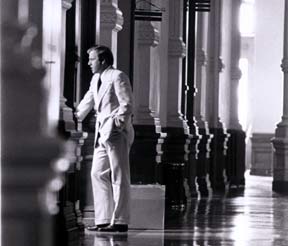Posted: 2/17/06
Strickland provided voice for poor, powerless
By Ken Camp
Managing Editor
Phil Strickland believed his mission was to provide a voice for the powerless in the halls of government and speak prophetically to Texas Baptists on moral and ethical issues.
After a long battle with cancer, resultant pneumonia silenced that prophetic voice Feb. 11 at age 64.
| Phil Strickland |
Strickland served 38 years with the Baptist General Convention of Texas’ Christian Life Commission, including nearly a quarter-century as director of the public policy and moral concerns agency.
“Phil Strickland helped Texas Baptists to remember and be faithful to their heritage, and he consistently declared the high ethical calling of the Christian life,” said BGCT Executive Director Charles Wade.
But while Strickland possessed a well-earned public reputation as a knowledgeable political insider, an outspoken advocate for children and a staunch defender of individual religious freedom and other historic mainstream Baptist principles, people with whom he came into contact individually learned he also was “a man of deep personal faith and prayer,” Wade noted.
“Everybody who ever spent any time around him grew in their Christian walk, their faith and their response to the gospel,” Wade said.
Strickland was a member of Wilshire Baptist Church in Dallas, where he had served as a deacon, Sunday school teacher and chairman of various committees. Pastor George Mason noted his church lost “a faithful servant,” Baptists lost a strong and prophetic voice, and “the kingdom of God has lost a skillful and passionate moral advocate for the weak and vulnerable of our world.”
Strickland possessed a rare combination of keen intellect and consistent activism, Mason observed.
 |
| For nearly four decades, Phil Strickland worked the halls of the Texas Capitol, lobbying for the BGCT Christian Life Commission on behalf of the poor and vulnerable. |
“He was always eager to learn the next thing, to read the next book, to measure his position on matters against those who could teach him something new. That curiosity bred creativity. His work for justice in the church and in the world was formed by the gospel and informed by the living Christ within him,” he said.
Strickland’s “never-ending quest” to make life better for children and to improve the lives of the overlooked and under-served energized his life, Mason added.
“The gospel was Phil’s preoccupation, and he occupied his life making sure it penetrated not only human hearts but human systems as well,” he said. “The spiritual and the social were always for him interconnected spheres of life. Since Jesus is Lord of all, Phil believed that society could better reflect the lordship of Christ if Christians would put the gospel into practice.”
Former Texas Speaker of the House Pete Laney called Strickland “an unwavering advocate” for Texans in need.
“His voice in the policy discussions at the State Capitol has made a significant impact on the lives of the state’s most vulnerable citizens—its children,” Laney said. “He has provided strong ethical leadership and is a reminder to us all that government exists to serve the people. His influence will never fully be recognized, and his presence will be deeply missed in Austin.”
Strickland often recalled that he took a leave of absence from a Fort Worth law firm in December 1967 to help Texas Baptists defeat gambling. And since gambling proved to be a perennial problem, he never returned to fulltime private legal practice.
Instead, he became the first—and for many years the only—registered lobbyist in Austin serving a religious denominational body.
Drawing on contacts made and lessons learned as a law school student when he worked as legislative assistant to Texas Lt. Gov. Preston Smith, Strickland lobbied lawmakers to oppose the spread of gambling, resist attempts to chip away at the wall of separation between church and state, and remember the needs of children—particularly the poor, abused or neglected.
To advance those causes, he built coalitions that spanned the political and religious spectrum.
Strickland became founding chairman of Texans Care for Children, the state’s first multi-issue child advocacy group, which brought together more than 50 organizations that address the needs of children.
Gov. Mark White appointed him first chairman of the Texas Council on Child Abuse and Neglect Prevention, a council created to oversee and coordinate distribution of the Children’s Trust Fund. He also served on a variety of other governmental advisory committees.
Weston Ware, who worked alongside Strickland at the CLC during nine regular sessions of the Texas Legislature and numerous called special sessions, praised his abilities as a coalition-builder.
“Phil not only was a political strategist par excellence, but he also was able to win the hearts and minds of diverse groups, often bringing together the most conservative and most liberal advocates to resolve difficult issues, as he did with the Religious Freedom Restoration Act,” Ware recalled, pointing to legislation aimed at preventing substantial burdens on the free exercise of religion.
“Few could say ‘no’ when representatives of the religious right and the American Civil Liberties Union or the Texas Freedom Network all came together on the same issues.”
Strickland earned a reputation for integrity, trustworthiness and professionalism among legislators in Austin, and that established credibility for anyone representing the CLC, Ware noted.
“It meant when I went to talk to a legislator, or to give testimony before a legislative committee, that Phil’s good reputation, gained over all the years since 1967, had gone before me,” he said. “It meant that a legislator could trust me, could value what I had to say, could believe that I had done my homework on the issue at hand because I worked for Phil Strickland, and Phil had never let him or her down.”
Nationally, Strickland served on the Inter-religious Task Force on U.S. Food Policy, the Bread for the World board of directors, the Americans United for Separation of Church and State board of trustees and the National Child Abuse Coalition.
He was a past president of the United Way of Texas.
Even though he held some prominent positions, Strickland worked mostly behind the scenes, said James Dunn, his immediate predecessor as director of the Christian Life Commission.
“Texas Baptists as a whole have no idea about the significant contributions Phil Strickland made to Texas Baptist life, to the state of Texas, to children and to a decent and just society,” he said. “His contributions remind me of an iceberg, in which perhaps only 1 percent of the massive movement is seen and 99 percent is hidden beneath the surface. That is the way Phil led the fight for truth and righteousness in Texas.”
Dunn, who left the Texas Christian Life Commission to become executive director of the Baptist Joint Committee on Public Affairs, also noted Strickland’s steadfast commitment to religious liberty and distinctive Baptist beliefs such as the soul competency of every individual.
“In a day when many Baptists seem to have amnesia about our heritage, Phil remained a rock-solid champion of religious freedom and the separation of church and state,” said Dunn, who teaches at Wake Forest Divinity School.
BGCT Executive Director Emeritus Bill Pinson praised Strickland for “his brilliance coupled with his dedication to Christ and his genuine concern for all persons (that) made him extraordinarily successful in Christian ministry.”
Strickland’s influence reached beyond Baptist circles and beyond Texas as he worked with various denominations for causes of social justice, Pinson noted.
“His application of the gospel of Christ to life includes practically every aspect of Christian ethics—family life, race relations, hunger, poverty, neglected children, alcohol abuse, gambling, economics, social justice, religious freedom, separation of church and state,” he said. “His positive impact across a wide spectrum of our world has been enormous. He surely will hear our Lord say, ‘Well done, good and faithful servant.’’”
An Abilene native, Strickland studied at Baylor University before transferring to the University of Texas in Austin where he earned both his undergraduate and law degrees.
He also pursued graduate studies at Southwestern Baptist Theological Semi-nary.
He is survived by his wife, Carolyn; daughter Delaine Mueller of Tucson, Ariz., her husband, Daniel, and their two children; daughter Shannon Holman of Lonoke, Ark., her husband, Merritt, and their two children; and his mother, Sybil Strickland of Abilene.
















We seek to connect God’s story and God’s people around the world. To learn more about God’s story, click here.
Send comments and feedback to Eric Black, our editor. For comments to be published, please specify “letter to the editor.” Maximum length for publication is 300 words.